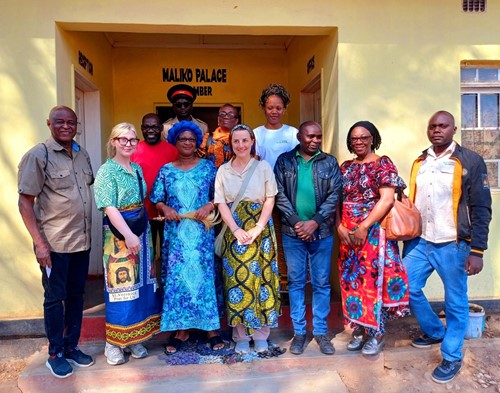The officials then visited Sinazongwe, a district where CJC interventions are making a tangible difference. During a meeting with Sinazongwe District Commissioner, Mr. Nchimunya Siakole, and Her Royal Highness, Chieftainess Sinazongwe, the visitors heard firsthand about the positive changes the project has brought. Her Royal Highness praised the programme’s inclusive nature, stating, "Your input has not left anyone out, including people living with disabilities, and that makes me happy. It is heartening to see that this project considers everyone in our community."
 The CJC team paying a visit to her Royal Highness,
The CJC team paying a visit to her Royal Highness,
Chieftainess Sinazongwe
During a stop in Chiyabi Ward, local farmers shared stories of how CJC has positively impacted this rural community. The primary livelihood is rainfed maize farming, and climate change has brought relentless challenges—droughts, high temperatures, and reduced crop yields. Yet, thanks to the CJC project, these farmers now have new tools to secure their future.
The Scottish officials observed firsthand how interventions like winter maize seed production on wetlands utilising residual soil moisture − the seed is being distributed to those who lost seeds during drought emergencies − improved small-scale irrigation systems, and village savings and loan associations (VSLAs) are turning the tide for the people of Chiyabi. The project’s efforts have increased food and income security by introducing drought-tolerant seeds and enabling year-round vegetable farming, primarily led by women. Boreholes have been drilled to provide reliable access to water, and VSLAs are empowering local women with financial literacy and business skills, allowing them to engage in small enterprises and support their families. VSLAs also serve as sources of loans for other business cooperatives in the ward, further strengthening the local economy.


 The CJC team paying a visit to her Royal Highness,
The CJC team paying a visit to her Royal Highness, 





